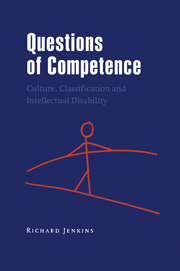Book contents
- Frontmatter
- Contents
- List of contributors
- 1 Culture, classification and (in)competence
- 2 Mental disability in the United States: an interactionist perspective
- 3 (In)competence in America in comparative perspective
- 4 Risk, resilience and competence: parents with learning difficulties and their children
- 5 Constructing other selves: (in)competences and the category of learning difficulties
- 6 Work, opportunity and culture: (in)competence in Greece and Wales
- 7 Slow cookers and madmen: competence of heart and head in rural Uganda
- 8 States and categories: indigenous models of personhood in northwest Greenland
- 9 Learning to become (in)competent: children in Belize speak out
- 10 Towards a social model of (in)competence
- Bibliography
- Index
2 - Mental disability in the United States: an interactionist perspective
Published online by Cambridge University Press: 16 January 2010
- Frontmatter
- Contents
- List of contributors
- 1 Culture, classification and (in)competence
- 2 Mental disability in the United States: an interactionist perspective
- 3 (In)competence in America in comparative perspective
- 4 Risk, resilience and competence: parents with learning difficulties and their children
- 5 Constructing other selves: (in)competences and the category of learning difficulties
- 6 Work, opportunity and culture: (in)competence in Greece and Wales
- 7 Slow cookers and madmen: competence of heart and head in rural Uganda
- 8 States and categories: indigenous models of personhood in northwest Greenland
- 9 Learning to become (in)competent: children in Belize speak out
- 10 Towards a social model of (in)competence
- Bibliography
- Index
Summary
This essay deals with ‘mentally disabled’ persons in the United States. To the average citizen, ‘mental disability’ equals ‘mental incompetence’; mental health professionals and laypeople agree that, because ours is a society oriented to complex technology, anything that impairs cognitive functioning disqualifies someone from full participation in the life of the society. The subtext of this remark is that anything that detracts from individual economic productivity is socially undesirable. Given this negative assessment, some advocates prefer to avoid labels that emphasise a lack of ability. My position, however, is that the label ‘mental disability’ serves a real – and not always negative – purpose; moreover, accepting the label ‘mental disability’ need not obscure the fact that the majority of people so designated have the capacity to learn and practise fairly sophisticated coping strategies that enable them to assert a personal identity based on self-perceived competencies.
My emphasis in this paper will be on adults defined as ‘mentally retarded’. As explained below, it is often not in the interest of these people to master cognitive skills that have exchange value in the marketplace. It is, however, both desirable and possible for them to attempt to demonstrate competence in those kinds of adaptive behaviour that affect their ability to develop and sustain social interactions. They often fail in such attempts, but so do many people considered ‘normal’. Mentally disabled people are incompetent not because of what they don't know (since everyone in our complex society has areas of genuine ignorance), but because, in the course of social interactions, they tend to choose less than fully effective ways to communicate the things they think they do know.
- Type
- Chapter
- Information
- Questions of CompetenceCulture, Classification and Intellectual Disability, pp. 25 - 53Publisher: Cambridge University PressPrint publication year: 1999
- 2
- Cited by



